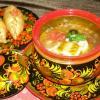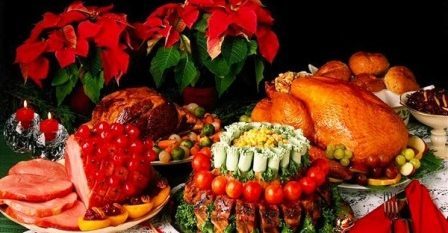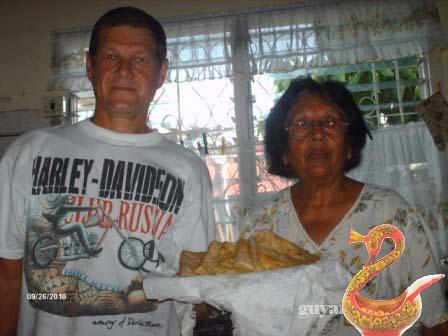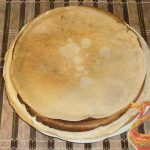Dhai Puri – indian pea tortillas
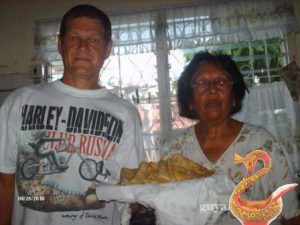
Description: Let’s try to cook a complex Indian, it‘s also a Guyanese dish – Dhai Puri dai puri or dal puri. In appearance, and a little in taste, these tortillas resemble our Armenian thin lavash.
But, there is a filling inside the daipuri – pea puree. They are very good together with any dishes made with curry. For example, fish curry, shrimp curry, etc. etc.
Ingredients
1,1⁄2 bowls Peas
1 Onion
3 teeth Garlic
1 chip Hot pepper
500 g Flour
1 tsp. Soda
1 tsp. Salt
3 tbsp. Olive oil
100 g Margarine
Instructions First of all, let‘s cook the peas. We put the peas in a saucepan, about 1.5 cups, pour water and put it to boil for 20-25 minutes.
Drain the excess water.
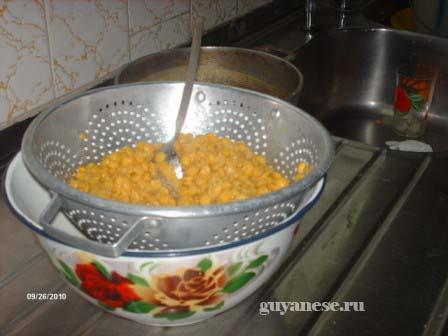
Peel and chop 1 medium onion and 4-5 cloves of garlic. Add a little chopped hot pepper. Fry everything in a frying pan with a small amount of oil.
We also add our boiled peas. Add salt to taste and add a little cumin. We leave it to simmer a little.
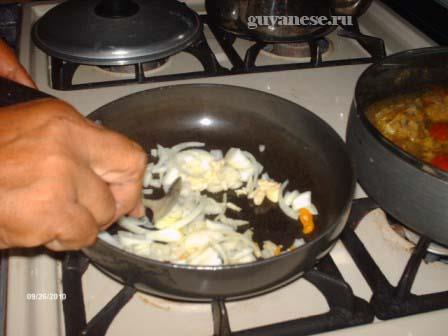
Then we grind everything into a puree. Better, in a blender.
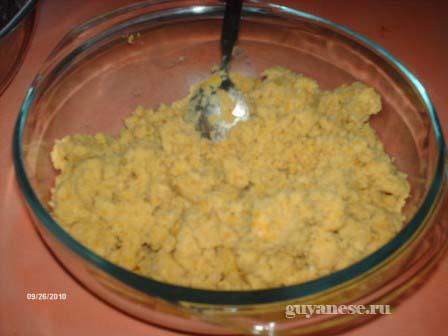
The filling is ready.
Let’s get down to the dough.
Pour about 500 g of flour into a bowl, add 1 tsp baking soda, 1 tsp salt and 1 tbsp olive oil. Slowly adding water, knead the soft dough. Leave it to stand for 30 minutes.
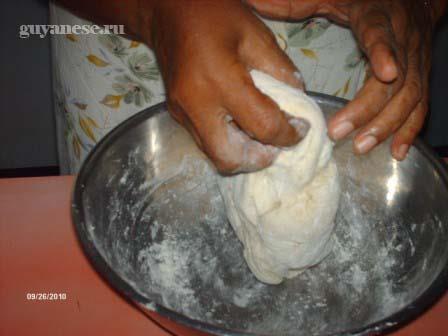
Prepare a 1:1 mixture of olive oil and margarine in a small bowl and start making tortillas. Divide the dough into small balls. There should be 15 pieces.
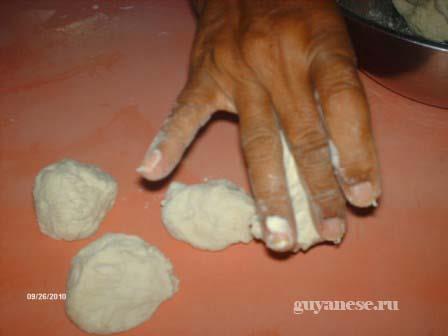
Next, you can stuff the tortillas in three ways: 1 way. Roll out the tortilla and cut it along the radius.
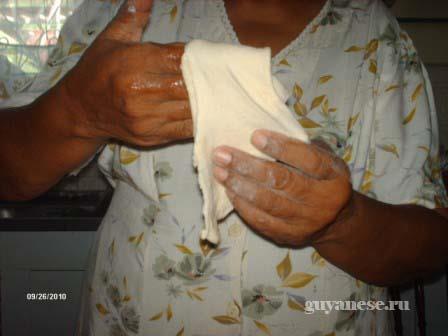
Brush with our butter and margarine mixture. Sprinkle evenly about 1 tbsp .spoon the filling, and roll everything into a ball around your fingers. Then seal the bag on the open side and flatten it a little to make a ball again. Leave to stand for 15-20 minutes.
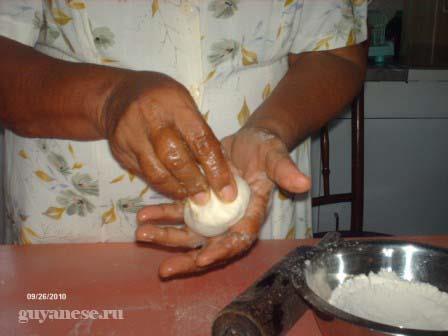
The second method We roll out the cake and resolve it along the radius, as in the first method. Then we wrap the cake, starting from the incision, on the arm, forming a fist. We put about 1 tablespoon of the filling in the bag, seal the bag and flatten it to make a bun. Leave for 10-15 minutes.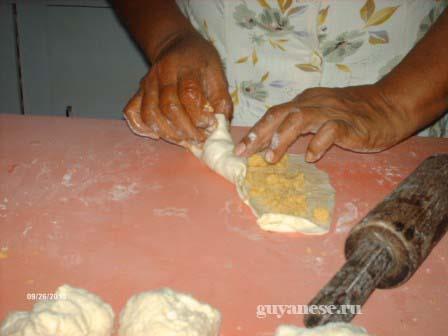
The third way: We simply form a small cake with our hands, about 10-12 cm in diameter, put the filling (1 tbsp.l.) in the center and seal the bun. We prepare all the buns with stuffing in any of the ways. Then carefully straighten our buns with our hands into small cakes. Now you will understand why the dough should have been soft. And now we’re slowly starting to roll them out, as thin as possible.
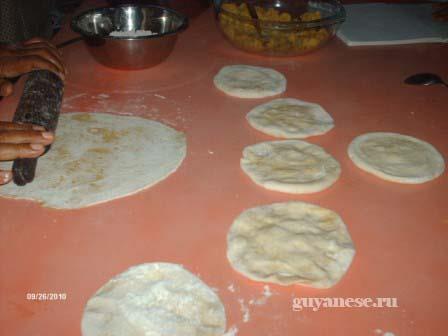
Grease a flat frying pan with our mixture of butter and margarine, and put the tortilla in the pan. Hindus use “tawa“ frying pans, completely without sides. It’s great if you find one. But we also fried it in a regular pancake pan.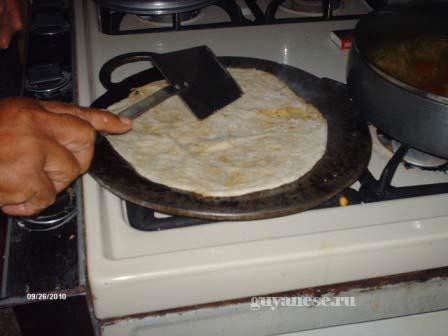
As soon as the cake begins to rise slightly (peel off), turn it over and lubricate with oil. Press a flat spoon against the pan to make it bake better.
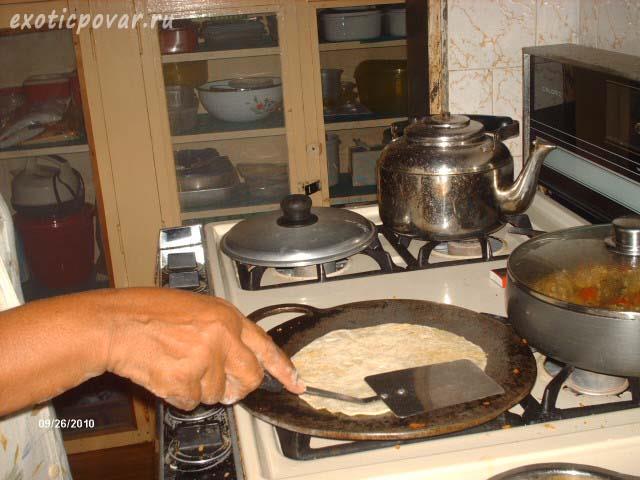
Turn it over again, and lubricate it with oil again. Indians use paper napkins for this purpose, and lubricate the tortillas with oil, as if blotting them, soaking them with oil on both sides. The flatbread is fried pretty quickly. The main thing is not to overdo it. Put the finished curries in a towel, or cover them with something to keep them soft. And welcome to the table. Our teacher on the difficult path of studying Indian cuisine was Aunty Nisha, a great expert in Guyanese cooking, and generally a wonderful, interesting person with a lot of life experience.
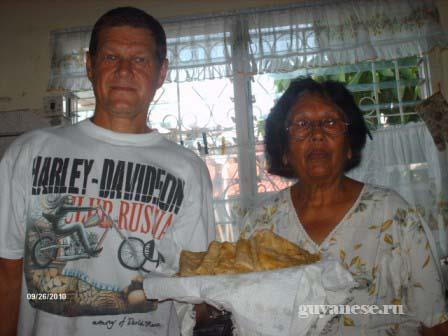
Indians use purri and roti instead of spoons and forks. They tear off a piece of flatbread, and grab a piece of fish, or, for example, curry chicken, and put it in their mouth.
It‘s extremely delicious! Especially in fish curry.
